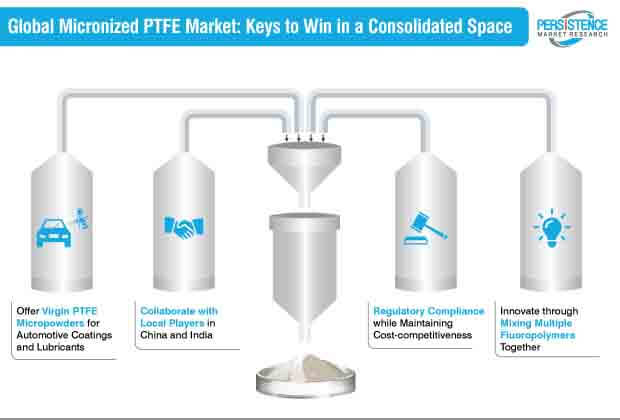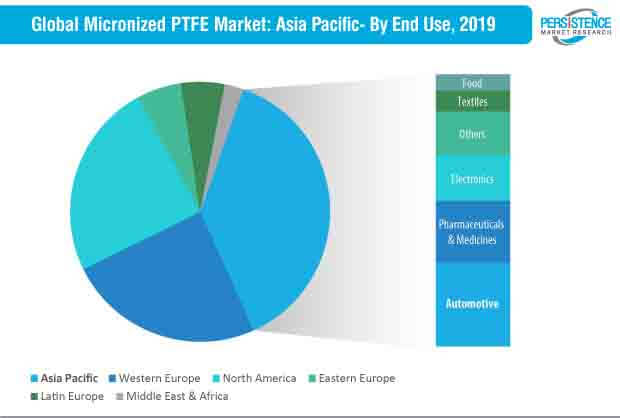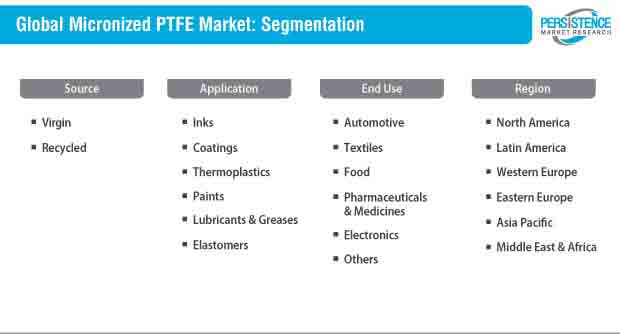Micronized PTFE Market Segmented By Virgin, Recycled Source in Inks, Coatings, Thermoplastics, Paints, Lubricants and Greases, Elastomers
Industry: Chemicals and Materials
Published Date: June-2019
Format: PPT*, PDF, EXCEL
Delivery Timelines: Contact Sales
Number of Pages: 210
Report ID: PMRREP4855
Micronized polytetrafluoroethylene (PTFE) has gained popularity as a wonder element in diverse industrial applications such as inks, coatings, lubricants, and paints, due to its versatile operational characteristics. Despite being a niche market, the micronized PTFE landscape is expanding rapidly, as its demand has been steadily increasing in a wide range of end-use industries after its accidental discovery.
With its high surface lubricity and anti-blocking properties, micronized PTFE is being accepted in industries such as food, textiles, pharmaceuticals, and electronics. However, the recent surge in the growth of the automotive industry has provided an impetus to the demand for micronized PTFE in anti-corrosion paints and coatings, in modern automobiles.
This trend is expected to only grow stronger with the rate at which global automotive production is increasing. This is likely to create lucrative opportunities and scope for innovation for micronized PTFE manufacturers in the coming years.
Taking into consideration the new avenues of growth and potential for micronized polytetrafluoroethylene in the protective coatings used in the automotive industry, Persistence Market Research (PMR) published a comprehensive study that offers a 360-degree analysis on the growth of the micronized PTFE market during the forecast period of 2019-2029.

The micronized polytetrafluoroethylene landscape, despite being a niche market, has undergone significant developments with its growing adoption in various industrial segments. The global market for micronized PTFE grew at a steady rate, and its valuation increased from over US$ 300 million in 2014 to around US$ 380 million in 2017.
In 2018, the market surpassed the US$ 400 million mark, and with the growing popularity of its applications such as inks, lubricants, and coatings, the sales of micronized PTFE are likely to grow by over 6% in 2019.
Manufacturers are foraying into new industrial verticals by innovating the properties of micronized PTFE, so as to meet specific end-use requirements and ultimately boost their profitable sales. However, the production of micronized polytetrafluoroethylene is subjected to stringent laws and regulations, including environmental and health & safety standards, set by the authorities in many countries, and this is incurring a significant rise in the manufacturing costs for stakeholders in the market.
In addition to this, it is becoming difficult for companies in the micronized PTFE industry to remain unaffected by the price volatility of petrochemical feedstock, which is the primary raw material that is used in the manufacturing of micronized PTFE.
In the coming years, leading manufacturers of micronized polytetrafluoroethylene are likely to focus on maintaining the cost-competitiveness of their products through the innovation and adoption of next-generation technologies, while ensuring regulatory compliance in this market.

Micronized wax powders are seeing burgeoning demand as an integral raw material in various applications, including inks, coatings, lubricants, and personal care products. The adoption of micronized PTFE in the manufacturing of inks is projected to account for more than one-fourth revenue share of the global market in 2019.
Ink manufacturers discovered the benefits of using polytetrafluoroethylene micro-powders, along with micronized wax powders, for boosting abrasion- and rub-resistance. The burgeoning demand for micronized PTFE in the ink industry is likely to prevail, accounting for around one-third revenue share of the global market, in the coming decade.
Apart from inks and coatings, the application of micronized PTFE in greases and lubricants has also gained popularity, with its superior thickening; low-friction coefficient; and non-stick, slip performance properties. The demand for virgin PTFE micro-powders is surging in the lubricants and greases used in the automotive industry, and this is expected to shape the upcoming strategies of leading market players in the years to come.
The global market for micronized polytetrafluoroethylene is highly consolidated among leading players, as large companies such as Chemours Company, Solvay, and 3M account for a whopping three-fourth revenue share of the global market. Market leaders have expanded their presence across geographies with a strong network of local suppliers and distributors.
In a bid to maintain their lead in the intensely competitive market for micronized polytetrafluoroethylene, leading players are adopting strategies to innovate their product ranges in the coming years.
In March 2018, Shamrock Technologies Inc. announced the launch of its new product—AquaFLON® MG, which is an aqueous dispersion of polytetrafluoroethylene and carnauba wax. The company declared that this innovative product is designed to improve the stability of the host material, and can be used as an additive to provide abrasion- and slip-resistance.
Also, a leading multi-technology company, 3M, also announced that it invests a significant share of its sales in research & development and innovation science. Recently, the company unveiled its proprietary technology to process polytetrafluoroethylene through 3D printers, which has paved the way for numerous possibilities, such as the fabrication of complex shapes.
The number of new entrants for micronized PTFE is multiplying in emerging markets such as China and India. Increasing growth of the automotive and paints & coatings industries is attracting investors as well as large market players to establish a strong presence in developing countries in Asia Pacific, especially in China.
Large players are focusing on collaborating with or acquiring local players to capitalize on the ever-increasing developments in end-use industries in emerging markets.

The authors of this report remain positive about the growing sales potential of micronized PTFE in a wide range of industrial sectors. It is highly likely that, the global market for micronized PTFE will grow nearly 2X over 2019-2029, and manufacturers who introduce innovative characteristics of polytetrafluoroethylene to meet the dynamic requirements of various end-use industries will gain an edge in the market.
While the changing regulatory framework will continue to have a significant impact on product pricing, micronized PTFE market players must focus on competing on innovation and expanding their geographical presence to strengthen their foothold in this competitive landscape.
Micronized PTFE, or micronized polytetrafluoroethylene, is a synthetic polymer. PTFE is prepared by the polymerization of tetrafluoroethylene with pure water. This process yields a product that is suspension grade or granular.
Most PTFE micro powders are made by the degradation of one of the grades of Natural Prime PTFE or recycling PTFE. PTFE micro powders are effective in temperatures as low as -100°C to as high as +250°C. Micronized polytetrafluoroethylene possesses numerous electronic relevant abilities, which is an important aspect of the electronics industry.
Virgin micronized PTFE is prominently used in electronics for its extreme chemical resistance, thermal stability, electrical insulation, and low friction coefficient; recycled micronized PTFE is used for coating applications. Acknowledging the micro- and macro-economic factors, the global micronized PTFE market has been studied with deep and increasing understanding. Emphasis on advanced materials and improved technologies, such as metal injection molding, is expected to continue to foster the demand for micronized PTFE over the forecast time period.
Increasing automotive manufacturing is creating lucrative opportunities for the micronized PTFE market. An increasing number of passenger vehicles, light commercial vehicles, and heavy commercial vehicles is expected to increase the demand for protective automotive coatings from OEMs.
Furthermore, the growth of the construction industry is also expected to positively affect the global demand for micronized PTFE over the coming years. Additionally, increasing industrial development requires micronized PTFE for protective coatings, which is expected to surge the demand for micronized polytetrafluoroethylene over the coming years.
The global micronized PTFE market is projected to grow at a CAGR of nearly 7%, and is estimated to reach an approximate value over US$ 800 Mn by the end of the forecast period.
In the application segments, the coatings segment is expected to be a prominent segment all through the forecast period, attributed to the growing demand from construction and automotive industries.
The automotive end-use segment is estimated to expand at a substantial CAGR of more than 6.5% over the forecast period. In 2019, the automotive segment is expected to hold nearly 5X share when compared to the pharmaceuticals & medicines segment, in the global market. The automotive segment is estimated to create an absolute $ opportunity of more than US$ 100 Mn, with key players vying to exploit a higher share of the market.
By end-use industry, the electronics segment is expected to achieve significant traction in the global micronized PTFE market, owing to the increasing demand for electronics over the recent years. The increasing dependency of customers on electronics has sky rocketed in recent years, and this is only expected to increase.
This global increase in electronic products is expected to affect the micronized polytetrafluoroethylene market positively over the forecast period, as micronized polytetrafluoroethylene has numerous applications in this field. The electronics segment is expected to hold a sizable share of the global micronized PTFE market, with an expected growth rate of more than 7.5% by the end of 2029.
By end use, the automotive segment is estimated to be an attractive segment as compared to the other segments, owing to the increasing production of automotive vehicles in recent years.
The continuous growth of this segment over the coming years is expected to increase the coatings market, which, in turn, is expected to boost the micronized polytetrafluoroethylene market.
The pharmaceuticals & medicines segment is projected to expand at a CAGR of more than 7.5% during the forecast period. In the global market, the food and textiles segment are projected to expand with little value shares. Micronized PTFE thin films and sheets inert and non-toxic for food & beverage equipment and applications.
The global micronized PTFE market is fragmented because of the presence of a large number of global companies operating in the market space, as well as numerous local manufactures across several regions, more so in China and India. The presence of a significant number of domestic and international players is creating a pretty competitive environment in the global micronized PTFE market.
Organized players are expected to hold more than 60% of the share, collectively, in 2019, through the selling of micronized polytetrafluoroethylene across the globe. Moreover, micronized PTFE manufacturers are strategically increasing their strong footholds across the globe through business expansion in developing as well as developed regions.
PMR’s study on the micronized PTFE market divides information into four broader categories-source, application, end use, and region. Detailed information about how the growth of the micronized PTFE market is being impacted by the dynamics and changing trends associated with these segments is also mentioned in this report.
| Attribute | Details |
|---|---|
| Source |
|
| Application |
|
| End Use |
|
| Region |
|
The study provides complete information about the adoption of micronized PTFE based on channels and systems across five geographical regions-North America, Latin America, Western Europe, Eastern Europe, Asia Pacific, and the Middle East & Africa. Readers can find comprehensive reasoning about the estimates on the revenue share of each segment in the global micronized PTFE market, in these geographical regions, throughout the forecast period.a
To know more about delivery timeline for this report Contact Sales
